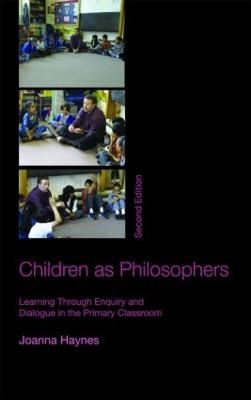
Children as Philosophers
Routledge (Verlag)
978-0-415-44681-5 (ISBN)
This fully revised second edition suggests ways in which you can introduce philosophical enquiry to your Personal, Social and Health Education and Citizenship teaching and across the curriculum.
The book demonstrates children’s capacities to engage in sophisticated processes of dialogue and enquiry about a wide range of issues and underlines the importance of listening to children’s ideas. The author discusses the pleasures and challenges for adults in managing discussion and responding to children's claims to knowledge in the philosophical arena. The author also addresses the well-established Philosophy for Children movement, developed in the USA and Australia and links this to the principles of Every Child Matters.
This fascinating book is an invaluable resource for all teachers and trainees seeking a thoughtful and contextualised introduction to the theory and practice of philosophical enquiry with children, including:
expanded discussion on children’s voice and participation at school
the theory and practice of dialogical approaches to teaching and learning
new evidence of the educational impact of philosophy with children in the classroom
what should inform the professional choice of resources for teaching philosophy
wider international debates about learning styles, skills and intelligence.
New reports are presented from children, teachers, from the fields of Gifted and Talented and Special Needs Education and from international research carried out over the last five years.
Joanna Haynes is a Lecturer in Education Studies at the University of Plymouth.
Preface to Second Edition Introduction PART I Voices from the classroom 1.Thought-provoking conversations 2.Making room for children to participate PART II Thinking about thinking 3.A distinctive approach to thinking through dialogue 4.What kind of thinking are we teaching? 5.Thinking, democracy and citizenship PART III Teaching through enquiry and dialogue 6.Encouraging listening 7.Respecting children’s ideas 8.Relaxing, meditating and being silent 9.Feeling for the philosophical 10.Working with different age groups 11.Holding and extending threads of thinking 12.Planning and monitoring progress in enquiry PART IV The benefits of philosophy with children 13.Developing teaching skills through philosophy 14.Thinking and learning in the whole curriculum 15.What difference can philosophy make to learning? References Index
| Erscheint lt. Verlag | 13.5.2008 |
|---|---|
| Verlagsort | London |
| Sprache | englisch |
| Maße | 138 x 216 mm |
| Gewicht | 249 g |
| Themenwelt | Geisteswissenschaften ► Psychologie ► Pädagogische Psychologie |
| Sozialwissenschaften ► Pädagogik ► Schulpädagogik / Grundschule | |
| ISBN-10 | 0-415-44681-3 / 0415446813 |
| ISBN-13 | 978-0-415-44681-5 / 9780415446815 |
| Zustand | Neuware |
| Informationen gemäß Produktsicherheitsverordnung (GPSR) | |
| Haben Sie eine Frage zum Produkt? |
aus dem Bereich


